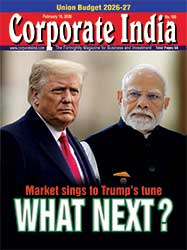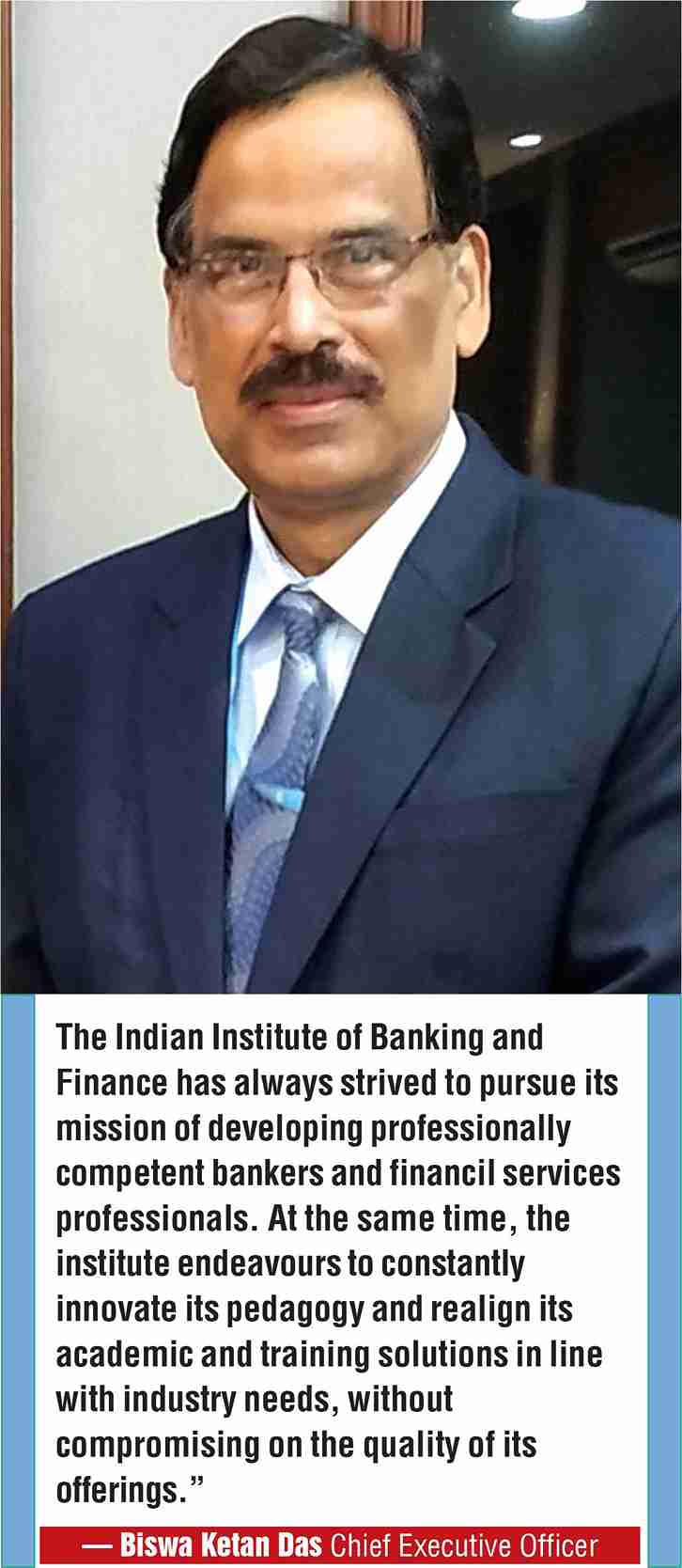Want to Subscribe?
Read Corporate India and add to your Business Intelligence

![]() Unlock Unlimited Access
Unlock Unlimited Access

Published: February 15, 2025
Updated: February 15, 2025
Tucked away in an obscure corner of Kurla, a kaleidoscopic central suburb positioned snugly in Mumbai, Indian Institute of Banking and Finance is quietly crafting professionally skilled bankers and finance professionals. Little wonder that the Indian banking system is renowned in the world today for its rich expertise, innovative approach and resilience. In 2008, when the financial meltdown shattered the global banking system with several banks, includ ing some world-leading giant banks, collapsing, the Indian banking system put up a strong, positive and prag matic show. IIBF, which will be celebrating its first century three years hence, has con tributed significantly in this re markable success as it has been developing profession ally qualified and competent bankers and finance profes sionals primarily through a process of education, training, consultancy, counselling and continuing professional de velopment programmes.

The institute, established in 1928 as the Indian Insti tute of Bankers on the lines of the London Institute of Bank ers, was a professional body of banks and their employees in India. Subsequently, with the rise of non-banking fi nance companies, the company’s name was changed to Indian Institute of Banking and Finance to in clude finance professionals working in finance compa nies. As of March 31, 2024 the institute has 10,78,485 ordinary members and 617 institutional members. With a total membership over a mil lion, IIBF is the largest institution of its kind in the world. During the last 97 years of its existence, IIBF has made a rich contribution to the banking and finance sector in India in a number of ways.
The institute offers a variety of courses, certifi
cates and diplomas to help people learn about bank
ing and finance. These courses are designed to help
people become experts in the field. It also offers
distance learning programmes for people who want
to study but can’t attend classes.
Professional development
IIBF offers Continuing Professional Develop
ment Programmes to help bankers develop their
skills through continuous learning.
Research
It conducts research on banking and finance
topics, including operations, products, instruments,
and processes.
Innovation
IIBF encourages innovation and creativity among
finance professionals.
Information
It collects, analyzes and provides information
to banking and finance professionals.
Certification
IIBF tests and certifies that people have at
tained the necessary competence in the banking
and finance profession.
The need for upskilling and deep knowledge in the banking and finance space has assumed a lot of importance of late. The paradigm shifts in the banking and fi nancial services ecosystem, fuelled by cutting edge technology and evolving customer expec tations across the globe, have resulted in a clearer recognition of cross-skilling and upskilling as in dispensable tools for progress. This is even more relevant for a knowledge-driven sector like BFSI. Indeed, it is heartening to find that the concept of ‘human sustainability’ has started to grab centre stage worldwide. Deloitte’s 2024 report ‘Global Human Capital Trends’ supports the idea that “when people thrive, business thrives”.
Maintains Biswa Ketan Das, a veteran banker and Chief Executive Officer of IIBF, “The Indian Institute of Banking and Finance has always strived to pur sue its mission of developing professionally competent bank ers and financil services professionals. At the same time, the institute endeavours to constantly innovate its pedagogy and realign its academic and training solutions in line with industry needs, without compromising on the quality of its offerings.” As the institute inches towards its centenary year in 2028, it is indeed a matter of pride to reflect upon and recognise the pioneering role played by it in the development of banking education in India.

However, the institute recognises the importance of evolving and reinventing itself continuously in sync with the changing ecosystem. The ‘Vision 2025’ document developed by it clearly mentions organizational strate gies and consequent goals in the short term for the over all development and sustainability of IIBF. While the vi sion broadly revolves round its core functions — edu cation, training and certification — due emphasis has been placed on leveraging digital advancements in de livery and outreach. With a clear objective of strength ening the institute’s core offerings, the syllabi for ts flag ship courses, JAIIB and CAIIB, have been thoroughly restructured to capture the nuances of an evolving sec tor from a more practical perspective and thereby create more professional value for its members.
Pointing out that IIBF recognises the importance of evolv ing and reinventing itself in sync with the changing ecosys tem, Mr Ketan Das says the institute has completed restruc turing of the syllabi of the RBI-mandated capacity-building courses in the specialised domains of treasury, credit man agement, risk management, accounting and audit, and for eign exchange, and has been involved in rationalising and updating all its diploma and certificate courses. The institute is also focusing on developing customised certifications for banks depending on the knowledge and skill-gap analysis of consultants with banks.
He adds, "Moreover, the institute is currently in volved in developing new certificatation programmes in customer service, operational risk management, retail bank management and IT security in banks, based on the feedback received from member banks and financial institutions."
Referring to a significant achievement of the institute, Mr Das reveals that IIBF has co-developed a self-paced e learning certification programme on climate risk and sus tainable finance along with International Finance Corpo ration (IFC) of the World Bank group. This programme has been divided in two certifications -- 'foundation' and 'ad vanced'. Going forward, the institute plans to offer these certifications to international candidates as well and de velop country-specific contents, if also desired. Addition ally, IIBF plans to conduct a series of physical training programmes on climate risk and responsible banking for banking and finance professionals in the four major In dian metropolitan cities, in collaboration with United Na tions Environment Programme - Finance Initiative (UNEP FI).
According to Mr Das, these workshops are expected to propagate general awareness and foundational capacity building on the impact of climate change and sustainable finance. In line with the global trend, the institute has em braced a 'digital first' pedagogy with a clear emphasis on highly immersive e-learning solutions. Maintains Mr Das with a smile, "Virtual training programmes conducted by the institute have garnered wide acceptance among the banking fraternity for their easy accessibility and the ability to reach out to a larger set of participants across the country, without compro mising on the quality of knowledge exchange and the content coverage. With 258 training sessions organised during the year for 9,298 candidates in total, the institute is well and truly poised to become the preferred training partner for bankers. Little wonder that the institute has been chosen by Department of Economic Affairs, Minis try of Finance, Government of India, to conduct training programmes for central and state government officers on select topics."
The institute has also decided to go one step back and has devised programmes for youngsters who would like to enter banking and finance space. "The idea is to catch them young," comments Mr Das. Pointing out that "the institute has continued to tread the path of collaborative growth by partnering with do mestic and international organisations of repute," Mr Das adds that internationally it has partnered with FPSB to offer academic credits and fee benefits to CAIIB-quali fied candidates in India pursuing the internationally recognised CFP programme in the wealth management domain. Moreover, the institute has collaborated with GARP to promote learning in the risk management do main through FRR certification. Domestically, the insti tute has been collaborating with IGNOU for an MBA course in Banking & Finance, with specific credits and/ or exemptions being provided to JAIIB/CAIIB-qualified candidates under the revised syllabi. It is also hearten ing to see that the institute has been consulted by Na tional Banking Institute, Nepal, in developing customised, country-focused courseware in Risk Man agement and Retail Banking.

February 15, 2026 - First Issue

Industry Review

Want to Subscribe?
Read Corporate India and add to your Business Intelligence

![]() Unlock Unlimited Access
Unlock Unlimited Access
Lighter Vein

Popular Stories
Archives
